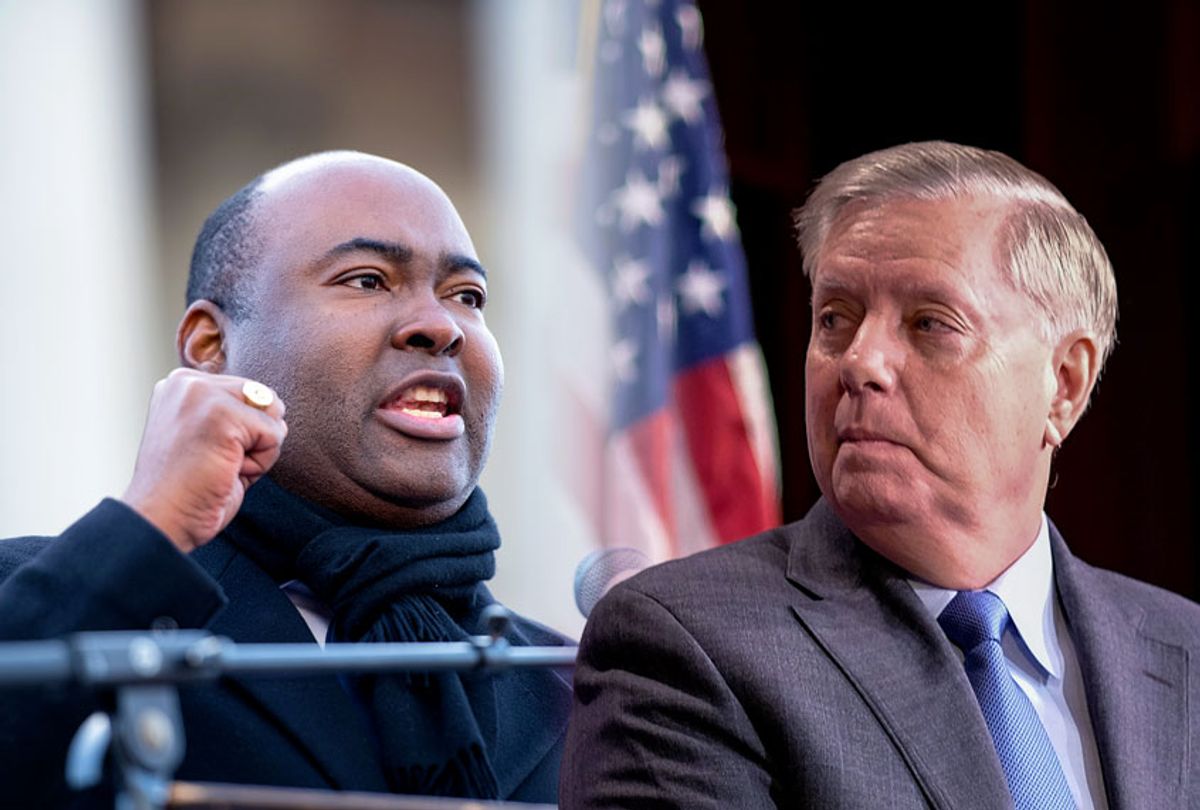Sen. Lindsey Graham, R-S.C., has lost the slim edge he once held in his re-election bid in the wake of his first debate against Democratic rival Jaime Harrison, according to the analysts at Cook Political Report. On Wednesday, the election monitor shifted the race's outlook from "lean Republican" to "toss-up."
Cook calls the race the contest the most "surprising race" of the year, and it characterizes Harrison, a quiet political veteran who put his chops on national display for the first time in last Saturday's heated debate, as "perhaps Democrats' best recruit and a fundraising behemoth."
"It's a jump ball at this point," one South Carolina Republican strategist told Cook. "Jaime is peaking at exactly the right time, and he's got a deluge of money. [Harrison] is blocking every pass there is from Republicans."
"Less than a month from Election Day, this movement is in a prime position to defeat Lindsey Graham and bring hope back to all 46 counties of South Carolina," Harrison campaign spokesperson Guy King told Salon.
King attributes Harrison's steady climb to a "values-driven campaign," which appeals to an inclusive range of South Carolinians by "addressing issues that Lindsey Graham forgot about long ago."
Harrison has zeroed in on healthcare, coronavirus relief for small businesses and broadband internet access as central issues, which he addressed in a ranging two-part interview with Salon in July.
Republicans, according to Cook, have privately expressed frustration that Graham did not take Harrison seriously from the start, pointing out that his narrative — "a charismatic 44-year-old African-American former state party chairman who tells a compelling story of growing up with a teen mother and being raised by his grandparents in impoverished Orangeburg" — is obvious political gold.
The Harrison campaign has famously raised record amounts of cash, but less well-publicized is how the funds have been allocated. Here, Cook points to the campaign's advertising game: Harrison has so far either spent or reserved $60.3 million worth of TV and digital ads through Election Day, an amount which will increase as Nov. 3 approaches. Graham, by contrast, has spent or reserved just $20.6 million.
The success of those ads is not merely in the volume, Cook notes. Harrison appeals to what could be "Graham's Achilles Heel — white women." His ads often feature middle-age or senior women with a record of supporting Graham, who now feel more closely aligned with Harrison's "values" on issues like health care.
"Harrison has made this race about character, and in other Democratic ads, they turn the tables and paint Graham as part of the 'swamp,'" Cook says. "And that seems to be working."
A Quinnipiac survey last week found the two locked in a 48-48 tie, a showing which the underdog has sustained for two months. Those results matched a Sept. 16 Quinnipiac poll, which also showed each candidate at 48%. Another Quinnipiac poll in early August found the two at 44%, and the Harrison campaign's internal numbers over the summer consistently showed a similar tight gap.
"There hasn't been a Democrat elected to the Senate from South Carolina since 1998," Quinnipiac University Polling Analyst Tim Malloy said in a news release. "Outspent and labeled by critics as an apologist for President Trump, Lindsey Graham is facing the fight of his political life."
Graham has used multiple recent media appearances about upcoming Supreme Court confirmation hearings to complain that he was "getting killed financially." The pain is real: Mitch McConnell's Senate Leadership Fund has recently boosted Graham with $10 million in ad buys through Election Day.
Cook attributes the problem to no one but Graham, who has "put himself in far more of a national lightning rod role than he ever was when he was the late Sen. John McCain's sidekick." Graham has publicly aligned himself with Trump, all but begging national Democratic backers to ship their checks to South Carolina.
Graham has recently turned for in-state support to his junior Senate colleague, Sen. Tim Scott, the only Black Republican in the upper chamber and the most popular statewide elected official in the Palmetto State by far, according to Cook. Scott has spoken up for Graham in two ads, which have just recently entered rotation.
But should Harrison win in November, South Carolina — the state whose secession from the Union in 1860 kicked off the Civil War — would become the first in U.S. history to send two Black senators to Capitol Hill at the same time.
Cook also points to the Supreme Court confirmation hearings for Amy Coney Barrett scheduled for next week as Graham's "one remaining Hail Mary." Graham, as chair of Senate Judiciary Committee, will play a marquee role in the hearings, which are expected to be explosive.
Graham will want to use the primetime facetime to remind South Carolina conservatives of his unique influence over the country's federal benches, as he did during last week's debate. Harrison sought to highlight a split in Graham's personal interests from those of South Carolina, and he brought a metaphor onstage with him — a plexiglass divider to separate himself from the incumbent, who had the week before participated in Barrett's Rose Garden nomination ceremony, now thought to be a superspreader event.
Graham self-quarantined in March after he was exposed to the infection during a visit to Trump's Palm Beach club, Mar-a-Lago. He did not take similar steps this time.



Shares